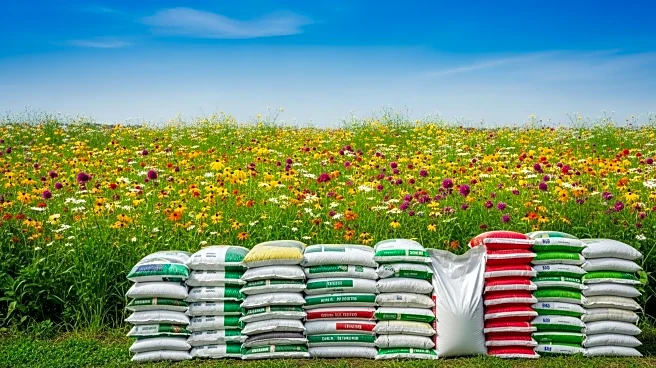What's Happening?
Nepal has experienced a significant increase in its chemical fertilizer imports, rising by 12.8% in the first month of the 2025/26 fiscal year. The imports reached Rs. 6.97 billion, up from Rs. 6.18 billion in the same period the previous year. This surge is attributed to the growing demand from farmers preparing for the paddy harvesting season and the sowing of winter crops. Fertilizers such as urea, DAP, and potash are crucial for enhancing crop productivity, particularly in rice, maize, and wheat cultivation. Despite the increase in imports, Nepal's agriculture sector remains vulnerable due to its heavy reliance on foreign fertilizer supplies, which strains foreign exchange reserves and exposes the sector to global price volatility. Farmers frequently face shortages, price fluctuations, and delays in government distribution, leading to protests during peak farming seasons.
Why It's Important?
The increase in fertilizer imports is a double-edged sword for Nepal's agriculture sector. On one hand, it could potentially boost crop yields and stabilize the food supply, reducing the country's reliance on rice and grain imports. This could enhance food security and improve rural incomes if managed effectively. On the other hand, the dependence on imported fertilizers poses significant risks. It strains Nepal's foreign exchange reserves and makes the agriculture sector susceptible to global market fluctuations. The challenges in timely distribution to rural farmers exacerbate these issues, potentially leading to economic instability and social unrest. The situation underscores the need for Nepal to develop a more sustainable and self-reliant agricultural framework.
What's Next?
To address these challenges, Nepal may need to explore strategies to reduce its dependence on imported fertilizers. This could involve investing in domestic production capabilities or developing alternative agricultural practices that are less reliant on chemical inputs. Policymakers might also focus on improving the efficiency of fertilizer distribution to ensure timely access for farmers. Additionally, there could be increased efforts to stabilize the agricultural supply chain to mitigate the impact of global price volatility. The government and stakeholders may need to collaborate on long-term solutions to enhance the resilience of Nepal's agriculture sector.
Beyond the Headlines
The situation in Nepal highlights broader issues related to agricultural sustainability and economic resilience. The reliance on imported fertilizers is a common challenge in many developing countries, where agricultural sectors are crucial for economic stability and food security. The case of Nepal could serve as a catalyst for regional discussions on sustainable agricultural practices and the development of local production capabilities. Furthermore, the ongoing protests by farmers reflect a growing demand for accountability and effective governance in managing agricultural resources. These dynamics could influence policy decisions and drive reforms aimed at achieving a more sustainable agricultural future.








